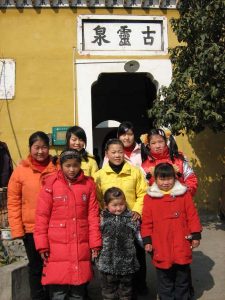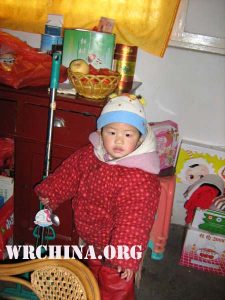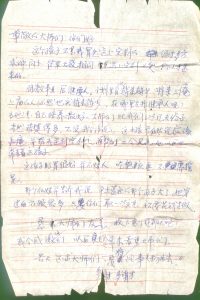The nuns and the girls in the monastery (Part 1)
Source: Women’s Rights In China 2008-3-13
- Patriarchy prevails the cultural city
I have heard by chance that the nuns from the Liu’ An and An Qing cities, under extremely difficult living conditions, had adopted many homeless girls. Since it was during the Chinese New Year holidays, I have decided to have a look at the situation there, and if it was indeed the case, perhaps, I could help the children in some ways.
Since the winter had just passed, there was heavy traffic congestion almost everywhere, hence I have chosen to head towards to the Tong Cheng city, which belong to the area of the An Qing city, located near the He Fei city.
This was the most renowned cultural city in the Ming and Qing dynasties. It was well-known for its Tongcheng literacy studies. The city once frequently produced scholars and renowned writers, and even had a family who held the prime minister position for three dynasties. Even in its present days, the quality of education and the cultural atmosphere in the An Hui province is also one of the best. Why, in a economic developed city where the people are educated and civilized, will there be frequent happenings of homeless children, especially the many cases of abandoning your very own biological child?
Upon alighting from the car, I headed straight towards the Pure Lotus Society, where the City Buddhist Association was located. Here lived four nuns, Priestess Kenosis, whom received me, had me introduced to the association and explained the situation of the nunneries nearby that were also adopting homeless girls.
“There are 3 girls in our nunnery now:”
The first child: Shi Lai Xing, adopted in year 1991;
The second child: Shi Wei Yi, adopted in year 1993;
The third child: Shi Zong He, adopted in year 2006.”
“Lai Xing and Wei Yi were abandoned outside the nunnery, while Zong He was found by the bus station and hence we adopted her.”
“Why do they have the surname ‘Shi’?” I asked, feeling puzzled.
“This is because when we adopted the children, we do not know their surname, hence we decided the children will follow the surname of the Buddha: Shi.” Priestess Kenosis explained.
“Do other nunneries adopt homeless girls too?”
“There are many of them. Baby girls are always being abandoned, and they are all adopted by the nunneries, however there are too many of them, and we cannot afford the increasing living expenses. We have tried our best to put them up for adoption, yet there are really no families to take them in, hence we will have to support them ourselves. There are fifty plus nunneries here in Tongcheng, we are unable to give an accurate number as to how many girls we have adopted in total.”
“I would like to visit the nunneries that have adopted the girls to have a look at the situation.”
“Since the snow in the villages has yet to melt, and the traffic is inconvenient, it is better to visit the nunneries nearby in this county.”
With the company of Priestess Kenosis, I have came to visit the nunneries in the city, namely, Gu ling Quan, Qiu Feng An and Bai Yun An.

The girls from Gu Quan Ling and other nunneries during Chinese New Year in 2008. (Photo/ Xin Lian, WRIC volunteer)
The Gu Ling Quan nunnery: 6 girls
The first girl: Shi Quan Wei, adopted in year 1991;
The second girl: Shi Quan Xing, adopted in year 1992;
The third girl: Shi Liu Ying, adopted in year 1992;
The fourth girl: Shi Quan Gen, adopted in year 1995;
The fifth girl: Shi Quan Hui, adopted in year 1998;
The sixth girl: Shi Quan Lin. Adopted in year 2002.
The Qiu Feng An nunnery: 2 girls.
The first girl: Shi Lai Ying, adopted in year 1994;
The second girl: Shi Qian Ke, adopted in year 1999.
The Bai Yun An nunnery: 2 girls.
The first girl: Shi Jie Ming, adopted in year 1992;
The second girl: Shi Jie Shun, adopted in year 1998.
Just the city’s four nunneries alone have already adopted 13 girls in total. The total number of nuns in these four nunneries is lesser than the number of the adopted girls. This was certainly out of my expectation. Yet, what was more surprising was the explanations of the situations by the nuns.
The first shocking fact was the background of the girls. These girls were abandoned immediately after birth by their parents, some wore clothes while some only have a piece of cloth. They were either abandoned outside the doors of the nunneries or the nearby forest or roadsides. Amongst the girls, Quan Gen had the most cruel fate. After her birth, her parents left her on the grassland, which they had set it on fire. It turns out that she survived the ordeal and was found by an old lady that passed by. The old lady sent her to the nunnery, from which the nuns sent the infant to the hospital for immediate treatment. Tears welled up in my eyes when I saw young little Quan Gen’s small and highly tanned body.
Secondly, why were the abandoned babies all female? The nuns explained that the village executed the one-child policy. All families wish to have a son, why have a daughter to take up the child quota? Hence, they either kill the infant girls or abandon them, as no families are willing to take in infant girls. They knew that nuns are known to be benevolent; hence we will usually find infant girls being abandoned outside the nunnery. The Priestess Sheng Ying said, just she alone, she has picked up around twenty infant girls. There was one year during the New Year where she consecutively adopted three girls on three consecutive days. She had simply found too many infant girls that she could not remember how many exactly are there. There was once she opened the nunnery door later than usually, and the infant had been frozen to death.
In addition, there is an issue regarding supporting these children. Because there are too many of them, and thus the living and education expenses have become unbearable. Therefore, they have submitted a proposal during the two meetings in the city during 1997, which has been approved, giving each child a birth certificate. Moreover, regardless of the age, every child will receive financial aid of 70RMB every month. Today, there is a policy that states that three documents need to be submitted when adopting a child. Hence, the children whom are adopted after 1997 do not need to have a birth certificate.
Economically speaking, 70RMB is just barely enough to buy three packs of milk powder, and not to mention they would be of the lowest quality. The nuns said that when money run low, they can only feed the babies twice per day. Though it is heart-wrecking seeing the babies cry due to their empty stomach, yet they had no choice. As the children grow up, they need to attend schools. School fees at elementary and secondary levels are still manageable, yet the pre-tertiary education levels require several thousands per semester. Thank goodness that the children are sensible and mature, they saved up by eating salted vegetables, which would cost them only a few cents everyday. Some of the children had decided to stop education after secondary school level, suggesting that their results could not catch up. Yet, the nuns all knew the real reason behind this, that the children wanted to lessen the burdens of the nuns. Whenever someone fell ill, what is left for them are the old ancient treatment methods, as they really could not afford the hospital fees. Moreover, the children do not have medical insurance, one consultation would cost them a few hundred RMB, or even up till four-digit figures, they simply don’t have this kind of money.
The vegetarian diets in the nunneries are certainly not the best for the children’s physical development, as they undergo adolescent. As I visited several nunneries, I have discovered that the vegetables, grown by the nuns, around the nunneries have all frozen to death. When new year comes, with no money to buy vegetables, everyone could only celebrate with salted vegetables, it is no wonder that the nuns and the children all had a pale face.
Initially, I wanted to stay on a few more days to visit more places, and have a look at more children. Yet, I simply could not bear to look at their poor state anymore. Seeing how difficult their living conditions are, I would not be able to leave for home with money on me. I gave them 2000RMB, which is to be split among them, as that is all I have with myself. I managed to get the last train heading back to He Fei on that day, as I see the beautiful expressway that pass by the bus window, the limousines whizzing through it like a river flow, who would pause, and think of the nuns living in the run-down nunneries, using the little donations to educate and bring up the many, many of abandoned children. As an individual, what I can do to help is really insignificant and limited, I would really to call out to everyone to kindly extend your warm helping hands to help the nuns and the children.
Pure Lotus Society: 00865566121902; Gu Ling Quan Nunnery:00865566132842
Qiu Feng Nunnery:008613966637657; Bai Yun Nunnery:00865566735110
- Though bringing up a child is difficult, the nuns don’t bear to send them to the social welfare institutions
Since it was the Lantern Festival, where people visit their relatives, I visited the Guan Yin nunnery located in the Bang Bu district.
Before this, I have managed to connect with the Duo Bao nunnery in the Liu’ An City through my friends, and mentioned to them that I would like to take a look at the six adopted girls in the nunnery, to see how have they been. While mentioning this, I also talked about helping to source for fundraising activities overseas to foot for the children’s living expenses. Little did I know that it was precisely because of this reason, that the nunnery refused my visit to them.
Because of the refusal to my visit by Duo Bao nunnery earlier, I have decided to visit the Guan Yin nunnery as a devotee. It was the fifteen day of the New Year, which means the Chinese New Year celebration is coming to an end. The nunnery was cold and empty. In front of the hall Of Great Strength sit a nun of about 40 years of age. Accompanying her, were two old ladies, of about 60-70 years old. A puny girl was sitting in and hearing their conversation.
After placing my offerings to the Buddha respectfully, I chatted with the middle-age nun.
“How many nuns are there in the nunnery?” I asked.
“There are three of us.” The nun answered, in a friendly tone.
“What is the child here for?” I asked, pointing to the girl beside me.
The elderly beside me explained: “ She was adopted by the nuns, there are two more girls who are not here, one of them attending classes in the kindergarten, while another in high school. This one (pointing to the girl beside me) is a little silly, if not she wouldn’t be staying at home (nun) staring blankly.”
“Where did the children come from?” I continued asking.
“All of them were sent to the nunnery by the public.”
“All of them are girls?”
“Of course! Who would bear to abandon an infant boy?”
“But would you all be able to support them?”
“Even if we can’t support them, we have no choice. People abandoned the children outside the nunnery pin hopes on us to bring these girls up, we could not simply wash our hands out of this.”
“That’s putting you all in a difficult position, most families already have difficulties bringing up one child, you all are bringing up three children, this is really not easy.”
“Precisely.” The nun said sadly. “The main issue is that the children do not have any citizenship account, what worries me are the school fees. I have plan to buy the two girls, who are attending schools, an account from the village, but an account from the village meant paying fees if you were to attend school in the city. The clothing and food expense are not a big problem, the residents and devotees donate much of these stuffs to us, and thanks to them, although it isn’t any easy life, but this is far better than my own childhood.”
“If they don’t have an account, why not send them to the social welfare institutions? This will solve the problem, isn’t it?”
“Send to there? No, I won’t bear to leave them. Perhaps you don’t have much understanding of these institutions. Inside are mostly children with physical disabilities, from a slanted nose to disfigured eyes, from lacking an arm to lacking a leg, those who are sent in without physical disabilities will be sold away within five days, or even lesser than three days, and if they were sold to foreigners, the institutions will even earn much profit!”
“These unfortunate girls are sent here, and I went through a hard time bringing them up, they wouldn’t bear to leave me either, I’d rather die than to send them there.”


A girl that was brought up by the nuns in 2008 Chinese New Year. (Photo: WRIC )
Upon conversing with the nun, I suddenly figured out something that has been puzzling me for a long time, that is, the reason why the nuns, despite all these difficult circumstances, did not send the children to the welfare institutions. Before arriving at Beng Bu, I gave a call to He Fei social welfare institute for children, explaining that I would like to visit the children there and perhaps buy them small gifts during the Chinese New Year. The person on the receiver was a young girl, claiming to be a staff in the institution. I asked about the total number of children in the institution, and whether if they need any supplies. The receiver replied, “It is private and confidential with regards to our total number of children, we have to follow the rules.” Hence, I said that if I do not know the number of children, how do I know how much quantity to buy. The receiver’s answer: The more, the better.
So the total number of children is a secret? What’s so secretive about this?
As I walk out of the Guan Yin nunnery, I wanted to take picture of an intellectually-disabled girl, yet when I turn back, the girl has already ran far away, staring at me with great fear in her eyes. She isn’t stupid; she must have run away when she heard the conversation between the nun and me. In future, I must take note of this issue and never talk about social institution in front of the orphans, because it took them so long to have a home of their own.
